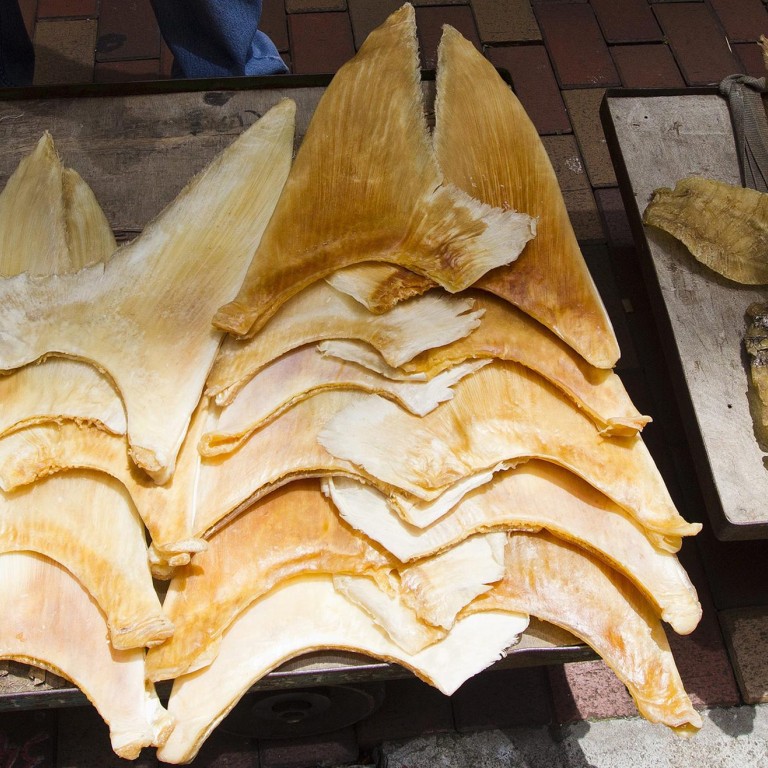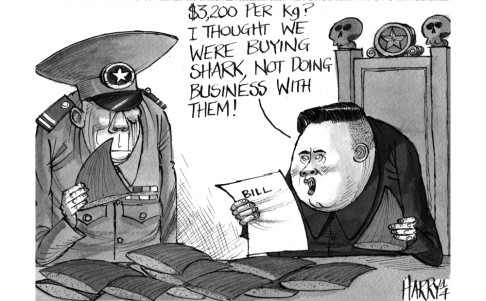
Pyongyang has deep pockets for shark fin from Hong Kong
North Korea is paying top dollar to Hong Kong to import the delicacy, suggesting it's a perk for elite officials in impoverished pariah state
North Korea may be poor, but it has for years been buying some of the most expensive shark fin on the market from Hong Kong.

But the HK$3,200 per kilogram it paid stood out as one of the highest prices paid by any country in the world, and was roughly four times North Korea's average per-capita income.
By comparison, Vietnam bought nearly a million kilograms of the same type of fin from Hong Kong last year - but at an average price of just HK$48 per kilogram.
The only country to fork out more per kilogram of premium fin was China, which paid HK$3,243 per kilogram for 288kg of dried fin with bone.
North Korea has for years been an importer of Hong Kong fins and has consistently paid some of the highest prices for them.
In 2007, the country imported a record 1,753kg of dried fin from Hong Kong at a price of HK$4,387 per kilogram. And in 2011, it imported just 20kg of dried fin but at a hefty HK$2,850 per kilogram.
By contrast, Singapore, Hong Kong's top re-export market that year, paid just HK$927 per kilogram for 52,251kg of the same type in 2011.
No fins were imported by North Korea in 2012 - the same year its new leader, Kim Jong-un, rose to power.
Ricky Leung Lak-kee, chairman of the Hong Kong Marine Products Association, said one possible explanation was that top North Korean officials may have been purchasing shark fin for their own consumption.
He said the only type of dried-fin product to reach prices as high as HK$3,000 per kilogram were lower caudal lobe fins, which were the top of the line.
Hong Kong trade statistics and harmonisation codes do not identify the species of shark a fin comes from, but 60 per cent of its fin re-exports are blue shark fins.
Officials of the Stalinist regime have gained notoriety for spending lavishly on imported goods from European cars to Cuban cigars, even as millions live in abject poverty there.
A few years ago, Kenji Fujimoto - the personal chef of late leader Kim Jong-il, who later defected - told of having to fly around the world for exotic and expensive delicacies, including premium sashimi from Japan and cognac from France.
Scott Snyder, a veteran North Korea watcher and senior fellow for Korea Studies at the Council on Foreign Relations, said: "It is absolutely plausible that shark fin would be a preferred delicacy consumed by North Korean elite.
"There is growing income inequality in North Korea and a patronage system by which Kim Jong-un still must satisfy a circle of top elites who are beneficiaries of that system."
A report to the South Korean parliament last year estimated that imports of luxury goods to North Korea totalled US$645.8 million in 2012, nearly double that of Kim's father.
The Hong Kong consulate of the Democratic People's Republic of Korea did not respond to inquiries.
Hong Kong imports fin from places including Indonesia, Spain, and Taiwan. The bulk of the fin is then re-exported to the mainland, Macau, Japan and Southeast Asia for consumption or lower-cost processing.
The city is a hub for the global shark-fin trade, taking about half the world's total fin harvest, says WWF-Hong Kong.
In 2012, Hong Kong became North Korea's No2 trading partner, with two-way trade reaching US$111 million, a 457 per cent jump from the year before, according to the Korea Trade-Investment Promotion Agency.


